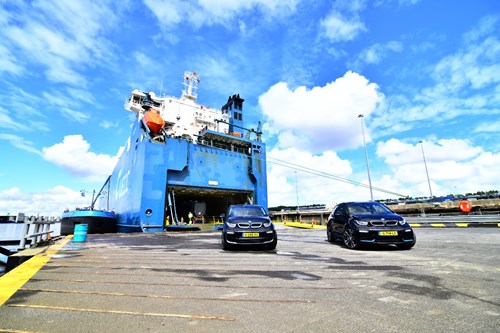BMW Group is farther down the road than many rival car makers in decarbonisation of its supply chain and believes sustainable logistics will not only benefit the environment but also give a competitive advantage to both itself and green shippers like UECC over the long haul.
The premium German vehicle manufacturer has a 40-strong planning team dedicated solely to finding new solutions to increase efficiency continuously and thereby reduce or eliminate CO2 emissions from every link in its distribution processes from production plant to dealer, including road and rail transport, car storage and sea freight.
“Sustainability is at the core of our corporate strategy and this is integrated in our decision-making processes when selecting transport and logistics providers,” says Thomas Wiech, who leads the team for transport planning in BMW Group’s vehicle distribution department.
The company has already more than halved CO2 emissions from its European new vehicle fleet since 1995 and reduced the level of emissions per vehicle produced by over 70% since 2006 by sourcing 100% renewable electricity for its plants worldwide.
BMW Group has now set emissions reduction targets per vehicle for 2030 of 20% in its supply chain including transport logistics, a further 80% from production and 40% in the vehicle usage phase, from a base year of 2019.
UECC biofuels trial
To this end, its green logistics team is pursuing among others so-called Lighthouse projects with transport providers that, for example, entail the use of alternative fuels on trucks and ships or renewable technologies such as solar panels on car storage warehouses to generate electricity to charge vehicles during transit.
One such project was the use of marine biofuel oil on leading short sea shipowner UECC’s 2080-vehicle carrier M/V Autosky as part of a pioneering trial in 2020 in collaboration with the GoodShipping Program.
BMW Group, which covered the premium for a biofuel volume corresponding to its freight carried by the vessel during the trial period, could claim a drastic emissions reduction of 80% to 90% for these shipments, totalling more than 41,000 tonnes of CO2.
“We are taking a structured and collaborative approach to achieve our emissions target in the supply chain through regular dialogue with our service providers to measure the environmental performance of our logistics and we are constantly learning from our network,” Wiech says.
At the same time, he says BMW Group is challenging its transport service providers to improve their environmental performance and this is a key criterion in its tender processes for transport contracts, as well as cost.
This clearly gives a competitive edge to car carriers such as UECC with a proactive approach to fleet sustainability in bidding for contracts, given BMW Group transported more than 2.3 million vehicles last year.
Costs driver
However, carbon-cutting measures in the overall supply chain are still the exception as the transport sector remains cost-driven, as is selection of logistics solutions.
There is a shift being observed though as a growing green conscience takes hold in the global market that is influencing car-buying choices, driven by national emission targets under the Paris Agreement, climate regulations and increased public pressure.
“Buyers of electric vehicles are also looking at the carbon footprint of a car manufacturer’s supply chain so green logistics measures are actually affecting the pattern of demand,” Wiech explains.
Presently, the main obstacles to green logistics are the lack of available infrastructure, such as alternative fuel stations for trucks, as well as technological limitations such as the range of existing electric vehicles due to battery capacity.
Wiech believes progress on this front is only a matter of time and ongoing political discussions in Europe and globally on carbon pricing could further accelerate infrastructure development and lower green supply chain costs.
“Clean logistics will be cheaper than dirty logistics in the longer term as regulations become tougher and carbon prices rise, with less sustainable supply chains leading to higher prices for the consumer and weaker profit margins for companies,” he says.
“So collectively adopting a sustainable mindset and taking the green route makes commercial sense in the long run.”

BMW Group has collaborated with green shipping carrier UECC on a biofuels trial in a push to make its supply chain more sustainable. Credit: BMW Group
For more information contact:
Bjorn O. Gran Svenningsen, Director Sales & Marketing, UECC
Email: bsv@uecc.com